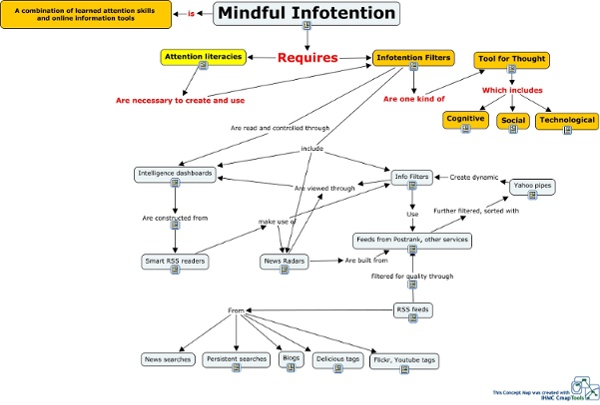



Integrating Netvibes, Pipes, AideRSS, Dapper for an intelligence dashboard Earlier today, Sam shared his executive dashboard that keeps him on top of our market’s information flow. I thought I would share some of the more technical details about integrating Netvibes, Pipes, AideRSS, and Dapper to create his dashboard. Defining our objectives We started this project with me interviewing Sam about the feeds in his reader. I also asked him about his behaviors online and existing relationships. I then pooled my notes [pic of my notes below] and began sketching up organizational concepts. Create Dapper feedsAggregate and manipulate feeds with PipesRun outputs through AideRSSImport feeds and configure modules in Netvibes Netvibes brings it all together I have to say that I haven’t done a comparative analysis between PageFlakes, NetVibes, iGoogle, MyYahoo, and the other players in the dashboard space. Powering modules with Pipes This is a big part of the secret sauce behind Sam’s dashboard. In addition to aggregating feeds, we use Pipes to manipulate feeds. Less is more
The Infotention Network | Life Skills for Digital Citizenship Are the New Millennium Learners Making the Grade? Using data from PISA 2006, this book analyzes to what extent investments in technology enhance educational outcomes. One of the most striking findings of this study is that the digital divide in education goes beyond the issue of access to technology. A new second form of digital divide has been identified: the one existing between those who have the right competencies to benefit from computer use, and those who do not. This finding has important implications for policy and practice.
Twilert - Twitter alerts via email Mindful Infotention: Dashboards, Radars, Filters | City Brights: Howard Rheingold Infotention is a word I came up with to describe the psycho-social-techno skill/tools we all need to find our way online today, a mind-machine combination of brain-powered attention skills with computer-powered information filters. The inside and outside of infotention work best together: Honing the mental ability to deploy the form of attention appropriate for each moment is an essential internal skill for people who want to find, direct, and manage streams of relevant information by using online media knowledgeably.Knowing how to put together intelligence dashboards, news radars, and information filters from online tools like persistent search and RSS is the external technical component of information literacy. Knowing what to pay attention to is a cognitive skill that steers and focuses the technical knowledge of how to find information worth your attention. The overall system I’m seeking to understand is one of mindful infotention. Infotention Filters
Climate Change Consequences - Often Unexpected Posted on 16 May 2012 by dana1981 An increasingly common fallback position once climate change "skeptics" accept that the planet is warming and humans are the dominant cause is the myth that climate change won't be bad. In fact, this particular myth comes in at #3 on our list of most used climate myths. It's an ideal fallback position because it allows those who reject the body of scientific evidence to believe that if they are wrong on the science, it's okay, because the consequences won't be dire anyway. One of my colleagues, Molly Henderson recently completed a Masters Degree program class on scientific research which focused on climate change, which she aced (way to go, Molly!). For her final research paper, she examined the consequences of climate change on the prevalence of water-borne diseases in the US Great Lakes region. The Problem Molly states the problem as follows. Climate Literature Investigating this Problem Adaptation Has a Cost References U.S.
5 Tools To Monitor Website Changes Want to know when prices drop at shopping sites? When someone posts a new message in a forum? When your favorite website updates that is not offering an RSS feed? All of these usage scenarios and many more cry for programs that can monitor website changes. What should a program that monitors website updates come with? The following list contains five tools for monitoring websites. Check 4 Change Check 4 Change is a Firefox add-on. A few options are provided by the add-on. Update Scanner Update Scanner uses a different approach than Check 4 Change. The interval of the checks for website changes is set to once a day by default. Available are sound and popup notifications. Site Delta Site Delta is the third (and last) Firefox add-on for monitoring websites. Users can configure the scan options in two tabs. The when to scan tab can be used to configure the intervals of the scans. Change Detection Change Detection is a free online service that can monitor websites for changes. WebMon Verdict
Crap Detection 101 | City Brights: Howard Rheingold “Every man should have a built-in automatic crap detector operating inside him.” Ernest Hemingway, 1954 The answer to almost any question is available within seconds, courtesy of the invention that has altered how we discover knowledge – the search engine. Materializing answers from the air turns out to be the easy part – the part a machine can do. Unless a great many people learn the basics of online crap detection and begin applying their critical faculties en masse and very soon, I fear for the future of the Internet as a useful source of credible news, medical advice, financial information, educational resources, scholarly and scientific research. The first thing we all need to know about information online is how to detect crap, a technical term I use for information tainted by ignorance, inept communication, or deliberate deception. “Ask a few questions and use available tools to see if you can find answers,” is what I told her when she asked me how to go about investigating.